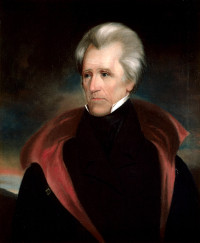Seventh president of the United States

Andrew Jackson (1767-1845) was an American soldier and statesman who served as the seventh president of the United States from 1829 to 1837. Before being elected to the presidency, Jackson gained fame as a general in the United States Army and served in both houses of Congress. As president, Jackson sought to advance the rights of the "common man" against a "corrupt aristocracy" and to preserve the Union.
Born
15 Mar 1767, in Waxhaw, South Carolina
Articles
Bureaucracy and the Civil Service in the United States, by Murray N. Rothbard, The Journal of Libertarian Studies, 1995
Historical examination of the evolution of the United States Civil Service and attempts to reform it, from its beginnings through the early 20th century
Historical examination of the evolution of the United States Civil Service and attempts to reform it, from its beginnings through the early 20th century
Jackson, an ardent Jeffersonian and Old Republican, was ... dedicated to a new Democratic Party that would restore original Jeffersonian Republican principles of laissez-faire and ultra-minimal government. [He] followed Jefferson in managing, for the second and presumably the last time in American history, to repay the national debt ... Jackson, a wealthy cotton planter and merchant in Nashville, had been energized by corruption in the Monroe administration and by the bank credit collapse in the Panic of 1819. He had served in the House of Representatives and twice in the US Senate.
Martin Van Buren: The Greatest American President [PDF], by Jeffrey Rogers Hummel, The Independent Review, 1999
Discusses the Van Buren presidency and why he should be considered "the greatest president in American history", even when compared to other nonactivist presidents
Discusses the Van Buren presidency and why he should be considered "the greatest president in American history", even when compared to other nonactivist presidents
In the midst of Old Hickory's second term ..., the president's hot temper almost provoked conflict with France over spoliation claims arising out of depredations on American commerce during the Napoleonic Wars ... The hero of New Orleans had looked on with pleasure as American settlers in the Mexican province of Texas declared independence in 1836 ... Although [Van Buren] helped to delay formal U.S. recognition of Texas independence until he had won the 1836 presidential election, the retiring Jackson menacingly pressed American claims for monetary damages against the Mexican government.
The Post Office as a Violation of Constitutional Rights, by Wendy McElroy, The Freeman, May 2001
Prompted by the announcement of the U.S. Postal Service eBillPay service (now discontinued), surveys the history of mail service vis-à-vis civil rights, from colonial days to the present
Prompted by the announcement of the U.S. Postal Service eBillPay service (now discontinued), surveys the history of mail service vis-à-vis civil rights, from colonial days to the present
In Andrew Jackson's first annual message to Congress ... (1829), he declared ...: "... [The Post Office] is chiefly important as affording the means of diffusing knowledge ... Through its agency we have secured to ourselves the full enjoyment of the blessings of a free press." By 1835, however, Jackson's address to Congress struck a different note concerning ... freedom of the press ... Some Southern politicians and postmasters called for a ban of seditious literature—namely, antislavery literature—from the mails. Jackson recommended that Congress pass a law to allow the prohibition.
States' Rights vs. Monetary Monopoly, by Thomas J. DiLorenzo, 9 May 2003
Recounts the story of how various states and Andrew Jackson maneuvered against the second Bank of the United States (BUS) eventually causing it not to be re-chartered
Recounts the story of how various states and Andrew Jackson maneuvered against the second Bank of the United States (BUS) eventually causing it not to be re-chartered
Americans once utilized ... states' rights traditions of nullification and interposition to assist President Andrew Jackson in his campaign to veto the re-chartering of the Second Bank of the United States (BUS) in 1832. [He] essentially ended central banking in America until it was revived thirty years later by the Lincoln administration ... Jackson essentially said "thank you for your opinion" and then thumbed his nose at the Court when it ruled that the BUS was constitutional ... Jackson is usually given credit for (temporarily) ending central banking in America in the nineteenth century.
The introductory paragraph uses material from the Wikipedia article "Andrew Jackson" as of 21 May 2018, which is released under the Creative Commons Attribution-Share-Alike License 3.0.
